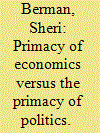|
|
|
Sort Order |
|
|
|
Items / Page
|
|
|
|
|
|
|
| Srl | Item |
| 1 |
ID:
173051


|
|
|
| 2 |
ID:
162668


|
|
|
|
|
| Summary/Abstract |
Among the many scholarly attempts to reckon with the causes and consequences of Donald Trump’s rise, few have attracted popular attention on the scale of Steven Levitsky and Daniel Ziblatt’s How Democracies Die. Seldom do books by political scientists make it onto the New York Times best sellers list, but this one has, a testament to its broad influence. Levitsky and Ziblatt situate Trumpism within a broader comparative and historical context in order to assess its similarities to and differences from democratic breakdowns elsewhere, particularly in Europe and Latin America. Their broad argument is that modern slides into authoritarianism are not the result of revolutions or military coups, but rather the consequence of a steady erosion of political norms and the assault on such fundamental democratic institutions as an independent judiciary and a free press. In short, contemporary democracies die not as a result of men with guns attacking from outside the system, but rather because elected leaders from inside that system slowly undermine them. Judged from this standpoint, the authors argue that American democracy is now in real danger, and they offer a range of suggestions for saving it. How convincing is Levitsky and Ziblatt’s analysis of democratic breakdown, and how well does it apply to the American case? How useful are the solutions that they offer for rescuing American democracy? We have asked a range of prominent scholars from across the discipline to consider these questions in the present symposium.
|
|
|
|
|
|
|
|
|
|
|
|
|
|
|
|
| 3 |
ID:
093538


|
|
|
|
|
| Publication |
2010.
|
| Summary/Abstract |
The United States hopes to create a strong central government in Afghanistan -- but is such state building possible? Yes, and policymakers should look to Louis XIV and the development of France's ancien régime for guidance.
|
|
|
|
|
|
|
|
|
|
|
|
|
|
|
|
| 4 |
ID:
148439


|
|
|
|
|
| Summary/Abstract |
As right-wing movements have mounted increasingly strong challenges to political establishments across Europe and North America, many commentators have drawn parallels to the rise of fascism during the 1920s and 1930s. Last year, a French court ruled that opponents of Marine Le Pen, the leader of France’s National Front [1], had the right to call her a “fascist”—a right they have frequently exercised. This May, after Norbert Hofer, the leader of Austria’s Freedom Party, nearly won that country’s presidential election, The Guardian asked [2], “How can so many Austrians flirt with this barely disguised fascism?” And in an article that same month about the rise of Donald Trump [3], the Republican U.S. presidential candidate, the conservative columnist Robert Kagan warned, “This is how fascism comes to America.
|
|
|
|
|
|
|
|
|
|
|
|
|
|
|
|
| 5 |
ID:
090863


|
|
|
|
|
| Publication |
2009.
|
| Summary/Abstract |
The current economic crisis has once again bought debates about capitalism and globalization to the forefront of the political agenda. Until very recently almost everyone seemed to be convinced that the world was at the dawn of a new era. Yet, the issue at the heart of globalization debates-whether political forces can dominate economic ones or must bow before them-is not new at all. I show that many of the great ideological and political battles of the last century were fought over precisely this ground, and argue that because we have forgotten or misunderstood these earlier debates our current discourse is thin and impoverished. To understand where we are and where we are going, we have to first step back and look closely at where we have been.
|
|
|
|
|
|
|
|
|
|
|
|
|
|
|
|
| 6 |
ID:
116108


|
|
|
|
|
| Publication |
2013.
|
| Summary/Abstract |
Two years after the outbreak of what has come to be known as the Arab Spring, the bloom is off the rose. Fledgling democracies in North Africa are struggling to move forward or even maintain control, government crackdowns in the Persian Gulf and elsewhere have kept liberalization at bay, and Syria is slipping ever deeper into a vicious civil war that threatens to ignite the Middle East. Instead of widespread elation about democracy finally coming to the region, one now hears pessimism about the many obstacles in the way, fear about what will happen next, and even open nostalgia for the old authoritarian order. Last June, when the Egyptian military dismissed parliament and tried to turn back the clock by gutting the civilian presidency, The Wall Street Journal's chief foreign policy columnist cracked, "Let's hope it works." (It didn't.) And Egyptian President Mohamed Morsi's attempted power grab in November made such nostalgia commonplace.
|
|
|
|
|
|
|
|
|
|
|
|
|
|
|
|
|
|
|
|
|